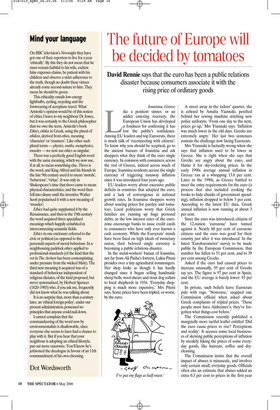Mind your language
On BBC television’s Newsnight they have got one of their reporters to live for a year ‘ethically’. By this they do not mean that he must remain faithful to his wife, eschew false expenses claims, be patient with his children and observe a strict adherence to the truth, though no doubt these virtues already come second-nature to him. They mean he should be green.
This ethicality entails low-energy lightbulbs, cycling, recycling and the forswearing of aeroplane travel. What Aristotle’s opinion would be of this notion of ethics I leave to my neighbour Dr Jones, but it was certainly to the Greek philosopher that we owe the term. Aristotle’s book Ethics, ethika in Greek, using the plural of ethikos, derived from ethos, meaning ‘character’ or ‘manners’. Like other such plural terms — physics, maths, metaphysics, measles — we now use ethics as singular.
There was a perfectly good English word with the same meaning, which we now use, if at all, to mean something else. Thews is the word, and King Alfred and his friends in the late 9th century used it to mean ‘morals’, ‘behaviour’, ‘virtue’. It was only in Shakespeare’s time that thews came to mean physical characteristics, and the word then fell into disuse until the inventive Walter Scott popularised it with a new meaning of ‘muscles’.
Ethics had quite supplanted it by the Renaissance, and then in the 19th century the word acquired three specialised meanings which happily cohabited in interconnecting semantic fields.
Ethics in one enclosure referred to the civic or political (as opposed to the personal) aspects of moral behaviour. In a neighbouring paddock ethics applied to professional standards (of the kind that the vet in The Archers has been contemplating under pressure from the wicked Matt). The third new meaning it acquired was of a standard of behaviour independent of religious dictates, of the kind proposed, but never systematised, by Herbert Spencer (1820–1903) who, if you ask me, frequently did not know what he was talking about.
It is no surprise that, more than a century later, an ‘ethical foreign policy’, under our present administration, possessed no principles that anyone could nail down.
I cannot complain that the commandeering of the word now by environmentalists is disallowable, since everyone else seems to have had a chance to play with it. But if you hear that your neighbour is adopting an ethical lifestyle, put out more razorwire. You’ll know he’s jettisoned the decalogue in favour of an 11th commandment of his own choosing.
Dot Wordsworth














































 Previous page
Previous page